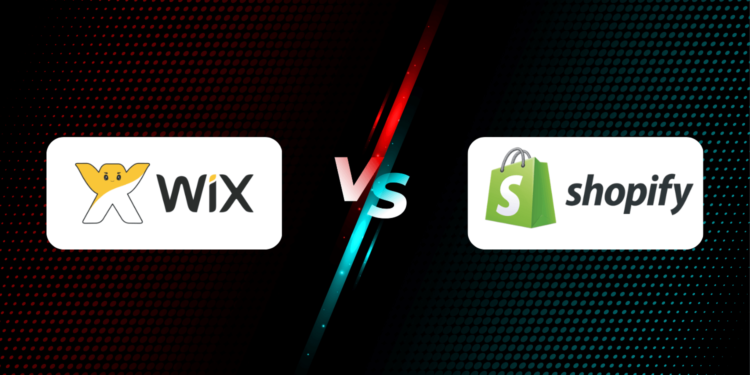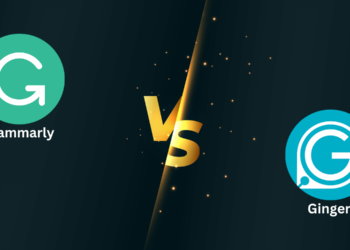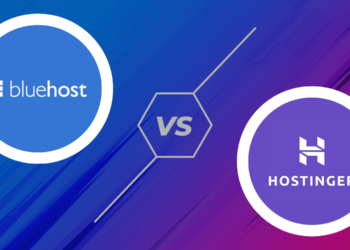Introduction
Explanation of Wix and Shopify
Wix vs Shopify: Wix is a website builder that allows users to create a website, online store, or blog with no prior coding or design experience. It provides a drag-and-drop interface and a variety of templates, as well as advanced features such as custom domains, e-commerce functionalities, and integrations with third-party apps.
Shopify, on the other hand, is a fully-featured e-commerce platform designed specifically for online stores. It provides all the tools and features needed to launch and manage an online store, from payment processing to order management and shipping. Shopify also offers a wide range of themes and apps to customize the look and functionality of your store.
Purpose of the article
The purpose of this article is to provide an in-depth comparison of Wix and Shopify, in order to help you determine which platform is better for your online store. We will be examining various factors such as ease of use, features, pricing, SEO and marketing, customer support, and security.
Overview of the key factors to be compared
The key factors that will be compared in this article are:
- Ease of use: How easy it is to set up and manage an online store on each platform.
- Features: The range of tools and functionalities available on each platform, including essential e-commerce features and advanced features.
- Pricing: The cost of using each platform, including monthly subscription fees and any hidden costs or fees.
- SEO and marketing: The ability to optimize your store for search engines and promote your products through marketing and promotional tools.
- Customer support: The availability and quality of support options and resources, including customer service and community support.
- Security: The level of security provided by each platform, including payment security and site security.
By examining these key factors, we will provide a comprehensive comparison of Wix and Shopify, so you can make an informed decision on which platform is right for your online store.
Ease of Use
Setting up an online store with Wix

Wix is known for its user-friendly interface and intuitive design, making it easy to set up an online store even if you have no prior experience. You can choose from a wide range of templates and customize them using Wix’s drag-and-drop editor, and the platform offers a variety of e-commerce functionalities, such as product management, order management, and payment processing.
Read also:
- Backlinks in SEO | Update 2023
- What is Ecommerce | 2023 Update for Beginners
- Effective keyword research
- Why Producing High-Quality Content Matters for Your Business
- what is email marketing
Setting up an online store with Shopify

Shopify is also designed with ease of use in mind, and setting up an online store on the platform is relatively straightforward. You can choose from a range of themes, customize your store using the theme editor, and add and manage products with just a few clicks. Shopify offers a variety of e-commerce features and integrations with third-party apps, so you can build a fully-featured online store with ease.
User interface and design customization
Both Wix and Shopify offer a range of customization options, including templates, themes, and the ability to add your own custom design elements. However, Wix offers a more advanced and flexible design editor, while Shopify’s themes and customization options are more limited. On the other hand, Shopify’s themes are optimized for e-commerce and provide a more seamless shopping experience for customers, while Wix’s templates are more general-purpose and may require more work to make them suitable for an online store.

In conclusion, both Wix and Shopify offer user-friendly interfaces and a range of customization options, making it easy to set up an online store. However, the exact ease of use may depend on your specific needs and experience, and you may find that one platform is better suited to your needs than the other.
Features
E-commerce features offered by Wix
Wix offers a range of e-commerce features to help you manage your online store, including product management, order management, payment processing, and shipping options. You can also integrate with a variety of third-party apps to add additional functionality to your store, such as live chat, email marketing, and social media integration.
E-commerce features offered by Shopify
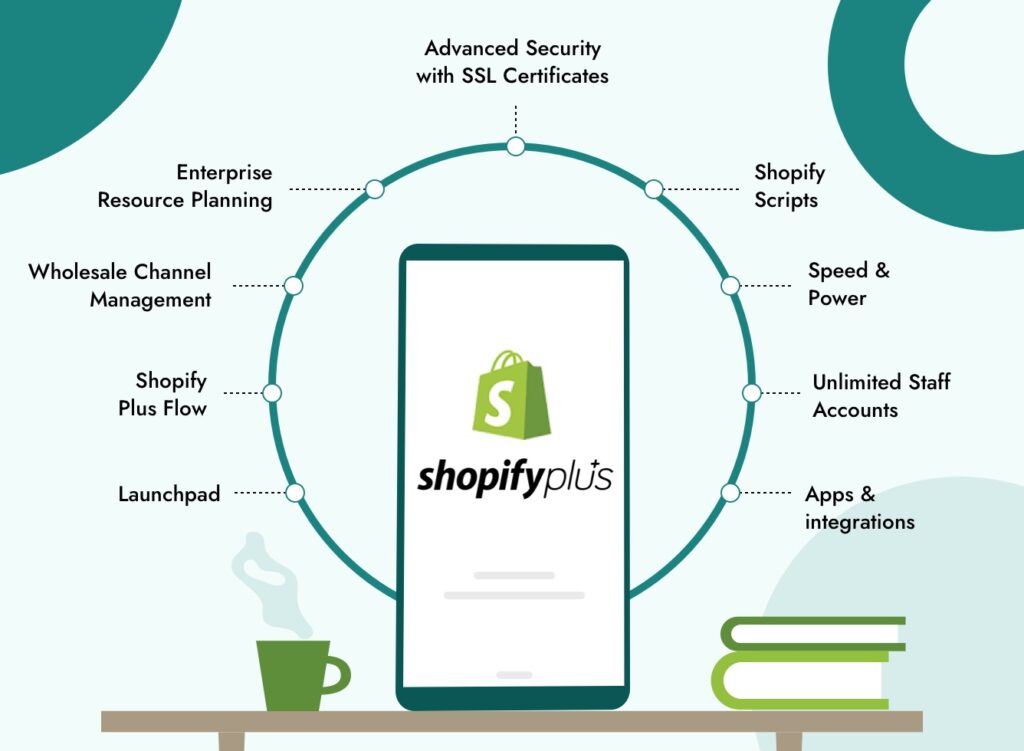
Shopify is a fully-featured e-commerce platform, and it offers all the essential e-commerce features you need to run a successful online store. This includes product management, order management, payment processing, and shipping options, as well as advanced features such as abandoned cart recovery, gift cards, and customer profiles. Shopify also has a wide range of third-party apps and integrations available to add additional functionality to your store.
Advanced features offered by Wix and Shopify
Both Wix and Shopify offer a range of advanced features to help you grow and manage your online store. These features may include website analytics, marketing and promotional tools, and integrations with other platforms and tools. Wix offers a more flexible and advanced range of features, including custom domains, email campaigns, and social media integration, while Shopify offers more specialized e-commerce features, such as abandoned cart recovery, gift cards, and customer profiles.
In conclusion, both Wix and Shopify offer a range of essential and advanced e-commerce features to help you run a successful online store. However, the exact range of features you need may depend on your specific needs and goals, and you may find that one platform is better suited to your needs than the other.
Payments
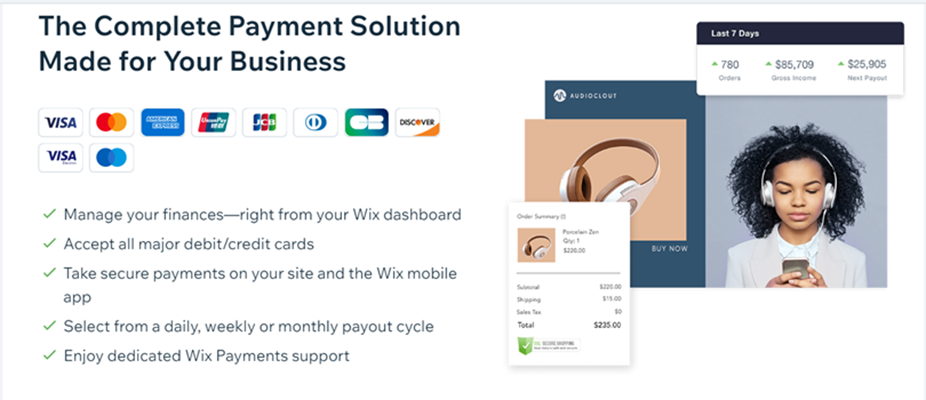
Payment processing options with Wix
Wix offers a variety of payment processing options, including credit and debit cards, PayPal, and other popular payment methods. You can choose from a range of payment gateways to process payments, and Wix offers a built-in payment solution for accepting online payments.
Payment processing options with Shopify
Shopify also offers a variety of payment processing options, including credit and debit cards, PayPal, and other popular payment methods. Shopify has its own payment gateway, called Shopify Payments, which is built into the platform and offers a seamless payment experience for customers. If you don’t want to use Shopify Payments, you can also integrate with a variety of third-party payment gateways.
Fees and charges for payment processing
Both Wix and Shopify charge fees for payment processing, and the exact fees you’ll pay will depend on the payment gateway you use. Wix charges a transaction fee for each sale you make, while Shopify charges a transaction fee for using third-party payment gateways, and a lower fee for using Shopify Payments. It’s important to consider these fees when choosing a payment processing solution for your online store, as they can add up over time and impact your bottom line.
Pricing
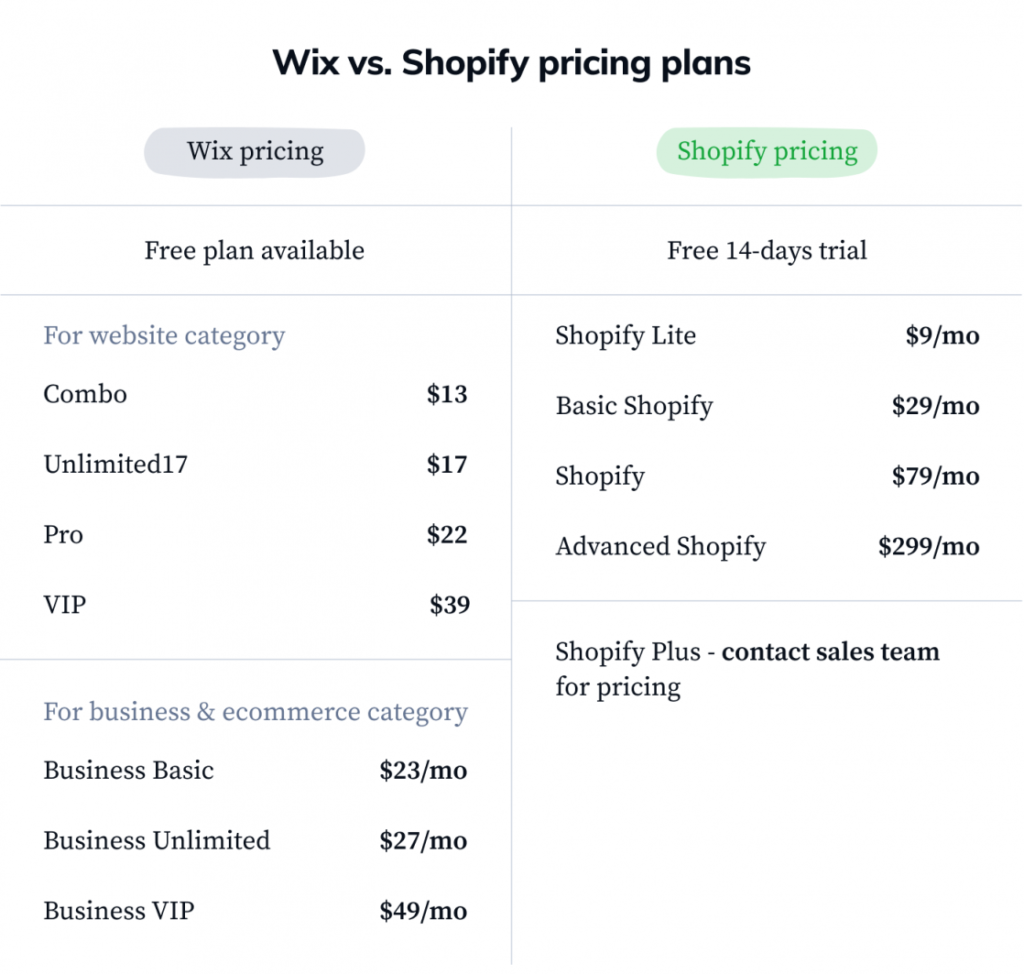
Wix Pricing
Wix offers a range of pricing plans to suit different needs and budgets. Their pricing plans range from a free plan with limited features, to a premium plan with advanced e-commerce and website building features. Wix’s pricing plans are generally more affordable than Shopify’s, and they offer a range of flexible pricing options to help you manage costs.
Shopify Pricing
Shopify also offers a range of pricing plans, ranging from a basic plan with limited features, to a premium plan with advanced e-commerce and website building features. Shopify’s pricing plans are generally more expensive than Wix’s, but they offer a wider range of e-commerce and website building features. Additionally, Shopify offers a range of advanced features, such as advanced reporting and analytics, that are not available with Wix.
Additional fees and charges
Both Wix and Shopify charge additional fees for certain features and services, such as domain registration, app integrations, and payment processing. It’s important to consider these additional fees when choosing a pricing plan, as they can impact the total cost of using the platform. Wix may have lower fees for certain services, while Shopify may have higher fees, but offer more advanced features and services.
Shopify App Store VS Wix App Market
Shopify is better
Why?
One reason is the vast selection of apps available on the Shopify App Store – with over 6,700 options – compared to just 300 on the Wix App Market. This provides you with more choices and flexibility when adding new features to your site.
Wix categorizes its apps into six sections: Marketing, Sell Online, Services & Events, Media & Content, Design Elements, and Communication. Meanwhile, the Shopify App Store has nine categories, including Sourcing and selling products, Store design, Merchandising, Marketing, Conversion, Fulfillment, Shipping and delivery, Customer service, and Store management. This expanded categorization provides a wider array of tools to help manage and grow your online business.
Both website builders offer email marketing, design, and customer communication apps. These tools allow for better engagement with potential customers and provide top-notch customer support. You can also enhance your store with live chat and chatbots to streamline lead collection and upselling.
SEO and Marketing
SEO features with Wix
Wix offers a range of SEO features to help you improve your website’s visibility and ranking in search engines. These features include customizable meta tags, sitemaps, and the ability to add alt tags to images. Wix also offers a range of app integrations, such as Google Analytics, to help you track your website’s performance and optimize your SEO.
SEO features with Shopify
Shopify also offers a range of SEO features, including customizable meta tags, sitemaps, and the ability to add alt tags to images. Shopify’s platform is optimized for search engines, making it easier for your website to rank higher in search results. Additionally, Shopify offers a range of app integrations, such as Google Analytics, to help you track your website’s performance and optimize your SEO.
Marketing features
Both Wix and Shopify offer a range of marketing features, such as email marketing, social media integration, and the ability to create and manage promotions and discounts. Wix has a range of app integrations to help you with your marketing efforts, while Shopify has a built-in email marketing tool and a range of marketing apps available for use.
Customer Support
Wix Customer Support
Wix provides customer support through a range of channels, including a comprehensive knowledge base, a community forum, and email support. The platform also offers 24/7 support for VIP customers, who pay for premium Wix plans.
Shopify Customer Support
Shopify also offers a range of support options, including a comprehensive knowledge base, a community forum, email support, and 24/7 support for merchants who pay for a Shopify plan. Additionally, Shopify offers live chat support during business hours, as well as a dedicated support team for higher-tier plans.
Security

Wix Security
Wix takes security seriously, providing SSL certificates for all sites on their platform to protect against potential hackers and data breaches. Additionally, Wix uses the latest security protocols and industry-standard encryption to protect sensitive customer data.
Shopify Security
Shopify also places a high priority on security, offering a secure platform for all online stores. All Shopify stores are automatically SSL encrypted, and the platform uses industry-standard encryption and security protocols to protect sensitive customer data. Shopify also implements daily backups to protect against data loss and offers PCI DSS compliant payment processing.
Conclusion
Wix and Shopify are both powerful platforms for building an online store, but each has its own strengths and weaknesses. When choosing between the two, it’s important to consider factors such as ease of use, features, pricing, SEO and marketing, customer support, and security.
In terms of ease of use, Wix is an intuitive platform with a drag-and-drop builder and a wide range of design options, while Shopify offers a more streamlined approach to building an online store. In terms of features, Shopify offers a wider range of options, including a larger app store and a more extensive set of tools for managing an online business.
When it comes to pricing, both platforms offer affordable options for businesses of all sizes, but Shopify may be the more cost-effective option for larger businesses. In terms of SEO and marketing, Shopify offers a range of features to help businesses improve their search engine rankings and reach more customers, while Wix provides a more limited set of tools for SEO and marketing.
Both Wix and Shopify offer robust customer support options, but the level of support you receive will depend on the plan you choose. In terms of security, both platforms provide robust security measures to protect your online store and customer data.
In conclusion, both Wix and Shopify are great options for building an online store, and the platform you choose will depend on your specific needs and requirements. Whether you’re a small business looking for an affordable solution or a larger business looking for more advanced features, both Wix and Shopify offer a range of options to help you build a successful online store.

